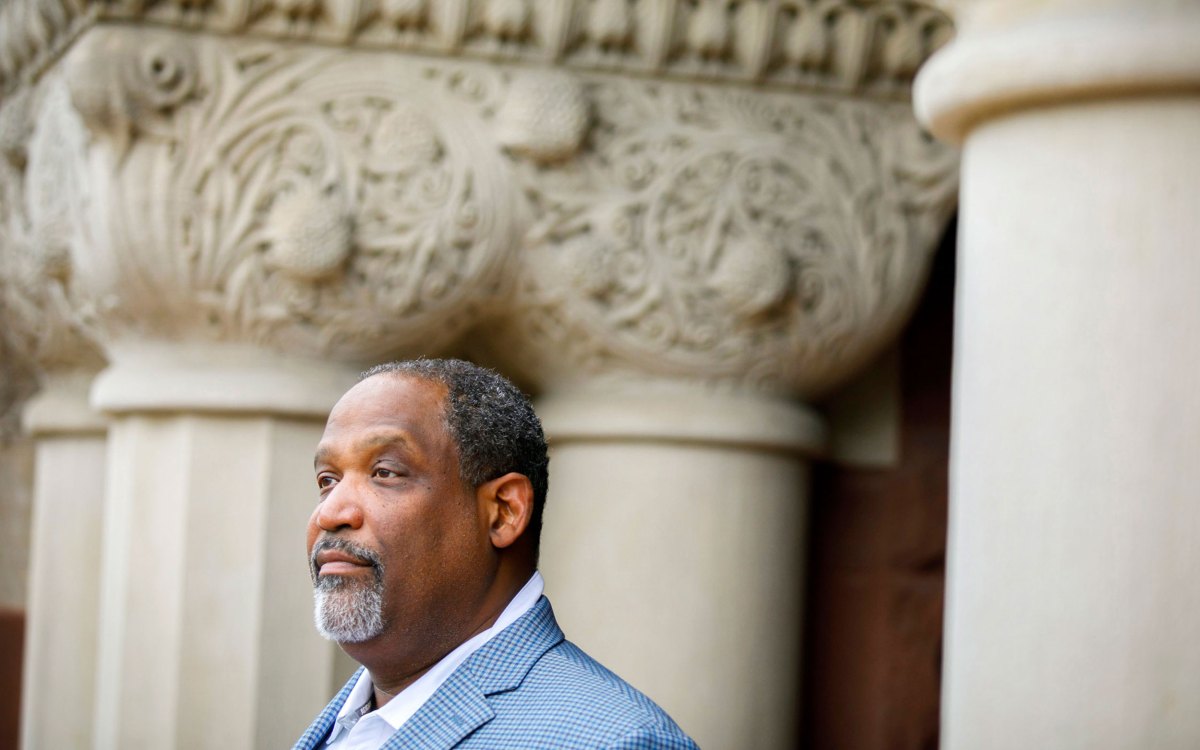
Think twice before saying ‘cult’
Survey shows intense support for ex-president despite indictments, but common claim against MAGA movement falls short of scientific rigor
Some critics of Donald Trump liken the dynamic between the former president and his followers to a political cult, a claim rekindled by polling released last month. When asked in a CBS News/YouGov survey who tells them the truth, 71 percent of likely Republican primary voters named Trump over their family and friends (63 percent), conservative media (56 percent), and even religious leaders (42 percent).
While politics does share some core DNA with cults, and Trump maintains an unusually powerful hold over his MAGA supporters, the reality of the situation is more complicated than a survey, or a pundit, can capture, says Bethany Burum, a research scientist in psychology who teaches a Harvard course on cult behavior. The interview has been edited for clarity and length.
Q&A
Bethany Burum
GAZETTE: The new polling suggests a cult around the former president, according to his detractors. What do you think?
BURUM: I tend to think of cultiness on a spectrum and there are elements of that in a lot of politics. Donald Trump is one of the more extreme examples, where he does have all this loyalty. But if you think about my definition, it’s on the border. Are people moving their beliefs away from the general society? A large portion of the country thinks Trump is great. Now that he’s risen to prominence — you can ask how he got here — it is a pretty normal belief to have in certain sections of the country.
I don’t know what percentage of people follow bad advice that Trump gives, but that would be an example similar to what we see in a cult — where you’re doing something against your interest. He made claims during COVID about certain medical treatments that didn’t work and might be harmful. People trying those treatments were doing something against their interest; people who give him more money than they really should are acting against their interest. And there are some people who do that. There are probably a lot of people, though, who don’t do any of that stuff. For them, it’s a little trickier to determine whether they are acting against their interest because of the diffuse influence of a vote.
If I vote for Donald Trump, that almost has no impact on anything because my vote is so small in proportion to all the votes cast. Collectively, we have a big impact, but me personally — what incentive do I really have to get that vote right? What sometimes happens in politics is that the social incentives are bigger than the incentives to get it right. I think this explains a lot of problems in politics. Because the social incentives can be quite strong to, say, demonstrate loyalty to your party, demonstrate loyalty to the person that everyone around you likes. And this is not limited to Republicans. Everybody has this social pressure to have certain kinds of beliefs that their friends and family and neighbors have.
My guess is that when they’re evaluating how much they trust Trump, many Republicans are really signaling loyalty to their group based on that incentive to be loyal to the Republican Party or loyal to their local community of Trump voters. When they start to think about their family and friends — people they really know — it becomes more of a real question of trust: How accurate is my mom about stuff?
GAZETTE: What makes a cult a cult?
BURUM: Everybody, even in the intellectual field, has a slightly different definition. How I define it in my class is by two benchmarks. The first is: Cults manage to shift people’s beliefs rapidly away from the broader society and away from the beliefs they had before they joined. The second thing I emphasize is that cult members act against their own interests and their families’ interests quite strikingly. The reason I highlight those two things is that when I’m talking about the psychology of cults, I’m interested in how the cult, and usually the cult leader, is able to have this kind of influence. Typically, the cult leader is benefiting in an exploitative way off of these two things, so many of those strange beliefs are about the leader being very important, often divine, the key to salvation against the apocalypse, etc. And then, more importantly, often the cult members’ labor is making the leader rich, or female cult members are expected to have sex with the leader and all men, besides the leader, have to be celibate. Cult members make extreme sacrifices that benefit the leader.
GAZETTE: Are there certain types of people or certain life circumstances that make people more vulnerable to cult thinking?
BURUM: It’s common to feel like the people who join cults must really be vulnerable in some way — and sometimes that’s true. But different cults target different kinds of people. There’s not just one demographic that is susceptible to cults. Many very successful, pretty empowered people have joined cults over the years. Some cults target young people because young people can be somewhat vulnerable. Who joins seems to be determined by who the cult leader targets and how the message is framed for a given group, as opposed to there being certain people who are susceptible to cults in general. Most anybody could potentially be drawn in.
GAZETTE: Is higher education any bulwark against falling prey to cults?
BURUM: Definitely not. I’ve seen no evidence that helps at all. Many target college students or target people with advanced education. In fact, sometimes cults want more economically prosperous or successful people. There are some cults that target the down and out, people who are the most vulnerable, but it’s the exception. Because the cult leader often wants to extract money and other talents and benefits from the members, they often go after educated people.
GAZETTE: What are some common red flags to watch for?
BURUM: Almost all cults are pretty ambiguous at the beginning and some even outright lie. Some say they’re a different organization than they are. So, that can happen. Anything that gives someone tremendous control over you, like moving to an isolated location, giving up your resources, or cutting off ties with friends and family. Even if they have the most noble justification, be very careful. That is extremely common in the worst cults. Encouraging you to be less connected to friends and family or an outside job or other demands or pressures that make you more dependent on the group are usually a bad sign. Anything that makes you more dependent on the cult leader, be wary of that.
Another one is how dissent is handled. Cults often prevent people from coordinating against the leader by making it really hard for anyone to dissent or to find other people who disagree. It’s not acceptable to say anything against the group or criticize the group in any way. That’s another big red flag. A really important one I talk about quite a lot is, where are the resources and power flowing? Are they all flowing to the leader? Is that person getting really rich off the organization? Is there sexual stuff going on where that leader has more sexual power and is sleeping with members of the group? All of those things are definitely red flags, as well.
The trick is that if you’re interested in joining this group, it’s probably because you’re really excited about it and really inspired by it, so it takes a little work to be skeptical and look past the noble justifications to the dangerous concentration of power.








